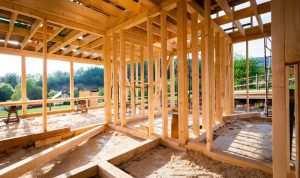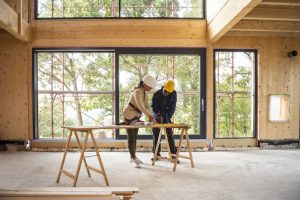Average Construction Timeframe
On average, new home construction takes anywhere from three to six months. However, this timeline may extend longer depending on the project size and complexity of features/materials used. Also, things like permits and inspections can make a big difference in how long it takes to build your new house.
-
Built-for-Sale Home: 6.5 MonthsÂ
Homes built for sale typically take six and a half months to complete construction. This timeline considers all necessary components, such as home design, foundation work, interior/exterior finishing, and any required inspections or permits. Also, the type of materials used may change the schedule, since some take longer to get or put in place than others.
-
Contractor-Built Home: 9.4 MonthsÂ
When a contractor is building a home, the time it takes to finish may be slightly longer than when building for sale. On average, contractor-built houses take nine and a half months to complete due to the more intricate elements like plumbing or wiring installation and the fact that builders often have multiple projects going simultaneously. Furthermore, team size and material availability all factor into timeline estimates.
-
Owner-Built Home: 12 MonthsÂ
When a homeowner builds their home, the average timeline can take 12 months or even longer. This is because owner-builders usually take care of everything about the project, from planning and getting permits to finding work and putting the finishing touches on the inside. Furthermore, they must factor in additional tasks such as budgeting, scheduling, and ordering materials, leading to a much longer timeline depending on how much time is available for dedication to the venture.


The Home-Building Process: Steps and TimelineÂ
Building a home involves several steps and generally follows the same timeline regardless of whether it’s built-to-sale, contractor-built, or owner-built. Here are the typical stages and timelines for the home construction process:
Pre-Construction
1. Finding and Purchasing Land: 1-2 Months
Pre-construction for home building typically begins with finding and purchasing the appropriate land. This could take one to two months, depending on availability, budget, and other factors. During this time, homeowners must secure necessary permits or inspections before beginning new construction.
2. Designing the Home and Getting Permits: 2-4 Months
Once the land has been purchased, designing and planning are the next steps in building a home. Typically, this phase takes two to four months, depending on the design’s complexity and any permitting requirements that must be fulfilled. Homeowners must also consider local laws, building codes, and budget constraints during this stage.
ConstructionÂ
1. Foundation and Framing Project Duration: 1-3 Months
Construction on the house can start as soon as the design is approved. This phase typically includes foundation and framing work which may take anywhere from one to three months, depending on how complex and detailed the project is. During this time, homeowners must ensure all necessary materials are ordered as well as any subcontractors needed for assistance are engaged.
2. Mechanicals: 1-2 Months
In the next step of building a house, mechanical systems like plumbing, heating, air conditioning, and electricity are usually put in. Depending on its complexity, this work may take one to two months. During this period, homeowners must ensure all inspections are conducted correctly.
3. Insulation and Drywall: 2-3 Weeks
Once the mechanicals are installed, insulation and drywall can be added. This stage typically takes two to three weeks, depending on how quickly the drywall can be hung and dried. During this time, homeowners must make sure that subcontractors are being properly supervised and that all materials meet requirements.
4. Flooring and Paint: 2-4 Weeks
The next step in the process is to install flooring and paint. This step typically takes two to four weeks, depending on what type of flooring needs to be laid and how much painting needs to be done. During this time, homeowners must order all necessary materials as well as supervise any subcontractors hired for the job.
5. Exterior Finishes: 2-3 Weeks
The final stage in home building is installing exterior finishes such as siding, roofing, and windows. This stage typically takes two to four weeks, depending on how much work needs to be done, but homeowners must ensure subcontractors are properly supervised. All materials meet code requirements during this time.
6. Final Touches and Clean-up: 1-2 Weeks
Once all previous steps are finished, final touches and clean-up can begin. This typically takes one to two weeks, depending on how much work needs to be done, with homeowners ensuring all subcontractors are properly supervised and materials meet code requirements. They should also ensure all debris is removed and the property is left in a condition compliant with local regulations.
Post-Construction


1. Landscaping and Outdoor Elements: 2-3 Weeks
Landscaping and other exterior features can be worked on by homeowners after the home is constructed and all finishes are complete. Generally, this stage takes two to three weeks, depending on how much work needs to be done. Also, they should think about any local zoning laws or ordinances when deciding how to design their yard.
2. Final Inspections and Moving In 1-2 Weeks
The final step in the home-building process is to complete any necessary inspections and move in. Generally, this takes one to two weeks, depending on how long the inspections take and how much work must be done before moving in. During this build time, homeowners must verify that all materials meet code requirements and that all paperwork has been filed. They should also take time to thoroughly inspect the property for any issues or defects that may have gone overlooked during construction.
Finally, after completing all these steps, homeowners can be proud of their accomplishments and relish living in their newly constructed homes.
Factors Affecting Construction TimeframeÂ
The duration of construction for a home can vary significantly based on several factors, such as the size and complexity of the project, local regulations, weather conditions, material availability, and subcontractor skill level.Â
-
Design and Complexity of Home
Home interior designs present both visual appeal and a degree of complexity that few homes can match. The design and complexity of a home can significantly affect its construction timeline. Homeowners building custom homes with intricate plans should anticipate the process taking longer than simpler standard houses. Furthermore, any additional labor or materials needed for special features or amenities will add further to this timeline for completion.
-
Weather and Environmental FactorsÂ
Weather and environmental conditions can significantly slow down construction projects. Outdoor work may be delayed by rain or snow, while certain materials may not be accessible during extreme temperatures. Furthermore, homeowners should remember that building restrictions may shift based on local environmental concerns, including any put in place due to environmental concerns.
-
Permitting ProcessÂ
The permitting process can significantly impact a homeowner’s construction timeline. They should expect to wait several weeks for permits before beginning construction, and any delays will add extra time to their overall project. Furthermore, ensure all paperwork is filled out accurately and completely, as any mistakes or omissions may lead to further delays.
-
Availability of Skilled Workers and SuppliesÂ


The availability of skilled workers and supplies can significantly affect the construction timeline. If necessary subcontractors and materials aren’t readily accessible, homeowners should take this into account when setting their completion dates; it may take longer to locate qualified professionals or obtain certain building materials than anticipated.
Overall, many factors can impact the construction time for a home. Homeowners should consider all of these when setting their expectations and be prepared for potential delays. Also, they should work closely with their home builder to make sure the project gets done quickly and well.
5 Tips To Shorten The Home-Building Timeline
Here are a few tips to help expedite the home-building timeline. By following these guidelines, homeowners can guarantee their project is finished on schedule with minimal delays.
-
Hire a Reputable and Experienced ContractorÂ
Hiring an experienced contractor is key for successfully completing a home-building project. Brewer Built LLC has years of expertise providing quality construction services to homeowners throughout Crystal, Minnesota, making them an excellent choice as your potential partner on this venture.
-
Plan and Stick to a Realistic Timeline
When setting a timeline for your project, it’s essential to be realistic. Discuss with your contractor the estimated duration of each stage and come up with an achievable goal that takes into account any potential delays or issues that could occur.
-
Keep Communication Open with Your ContractorÂ
Once the project begins, maintain an ongoing dialogue with your contractor. Check in regularly on progress and take proactive measures to address any issues that may arise; this will help guarantee the timeline remains on track and minimize delays.
-
Be Flexible and Prepared for Changes
Unexpected changes and delays can occur during home construction, so it’s essential to be flexible and prepared. Following a rigid timeline without considering potential delays or issues can lead to frustration or even costly errors.
-
Stay on Top of Finances and BudgetingÂ
Staying organized with finances and budgeting throughout the home-building process is essential. Tracking costs closely helps prevent going over budget, which could add extra time to complete due to additional funds needing to be raised. Make sure all payments are up-to-date so that you understand exactly what you’re paying for.
By following these tips, homeowners can ensure their home-building project is completed as efficiently and effectively as possible. With careful planning, a realistic timeline, open communication with your contractor, flexibility in case of delays or changes, and staying on top of finances and budgeting, you’re sure to enjoy a smooth home-building journey that meets all your expectations.
Conclusion
Concluding a home-building project on time requires careful planning and management. With the right contractor and an achievable timeline, open communication with your contractor, flexibility when delays or changes happen, and careful money management, you can guarantee it’s completed efficiently and effectively. These tips and strategies will ensure you have an excellent experience during home-building—something Brewer Built LLC is here to assist you with. Reach out today to start working on your dream home.






